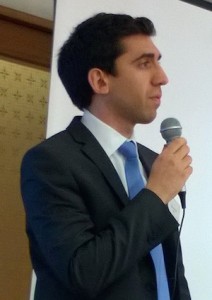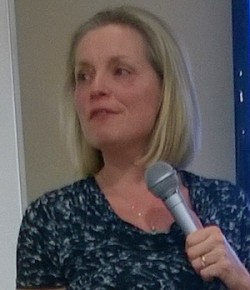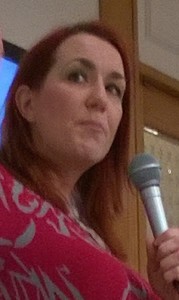 Abraham Lincoln
If given the truth, the people can be depended upon to meet any national crisis...
Abraham Lincoln
If given the truth, the people can be depended upon to meet any national crisis...
 Guildford news...
for Guildford people, brought to you by Guildford reporters - Guildford's own news service
Guildford news...
for Guildford people, brought to you by Guildford reporters - Guildford's own news service
Rape And Sexual Abuse Support Centre Exploring How It Can Best Support Clients
Published on: 16 Mar, 2015
Updated on: 16 Mar, 2015
Guildford-based RASASC, the Rape and Sexual Abuse Support Centre, has presented the first in a series of events exploring how it can best support its clients.
Held at Guildford YMCA, the first in the series, titled Sexual Abuse – What every professional should know, took place last month. More than 70 participants from a wide variety of professions attended, including counsellors, psychotherapists, police officers, NHS staff, midwives, drug and alcohol abuse support and survivors.
 The focus of this event was to bring together a wide range of professionals from different settings to share their expertise in working with survivors.
The focus of this event was to bring together a wide range of professionals from different settings to share their expertise in working with survivors.
RASASC believes that through initiating dialogue we can widen our perspective about sexual abuse and understand more about what helps and hinders survivors in disclosing their experiences and getting the help they need.
The event provided participants with the opportunity to network, share their experiences and engage with the speakers.
Sally Hutton and Susan Cowan opened proceedings with an overview of the Independent Sexual Violence Advisor (ISVA) service provided by RASASC. As part of the team of four ISVAs at RASASC providing practical and emotional support to male and female survivors aged 13 and over, no two days are the same.
Sally explained: “Our service is all about choice. We help survivors make informed decisions, which may be about reporting to the police or accessing counselling. We also signpost survivors to other agencies such as sexual health, housing, substance misuse and provide support at appointments, for example at the Sexual Assault Referral Centre if a client chooses to give forensic medical evidence.
“Although accepting support can be very difficult, we know about the difficulties people may face coming to terms with the effects of rape and sexual abuse. We can talk through their feelings, what they may expect to feel, and support them in their ongoing relationships with friends, family and employers. Nothing can change what has happened to our clients, but we can help change how they feel now and in the future.”
Ian Cole MSc works with Virgin Care as a development worker for gay and bisexual men. In his presentation he explored the implications of gender expectation, and particularly the impact this can have on how survivors access support services. In a society that conveys strong gender stereotypes from birth, such as ‘Men are supposed to be able to protect themselves’, it is perhaps little surprise that men are less likely to report rape, and many find it easier to blame themselves than to accept they can be overpowered.
The following presentation, by Dino Nocivelli, a solicitor with Bolt Burdon Kemp, provided insight into the impact of child abuse and the legal process of submitting a civil claim. The impact of abuse on survivors’ lives is often life-long and far reaching – affecting their relationships, job prospects and physical and emotional wellbeing. A civil claim seeks to go some way in compensating a survivor for the trauma they have suffered, and helping them to rebuild their lives.
Participants then heard from the inspirational Chris Tuck, an author and health coach. Drawing from personal experience, Chris spoke of how abuse affects an individual’s health and wellbeing.
Exercise and good nutrition continue to play a key role in Chris’s recovery. Chris also spoke about how those who have suffered abused in childhood may need extra support parenting their own children in later life, as further detailed in her autobiography Through The Eyes of a Child and Parenting Without Tears.
The final presentation of the day was delivered by Zoe Lodrick, a sexual trauma specialist. She explored the psychology of both the offender and the victim, addressing the complex processes that result in victims’ becoming ensnared in abuse dynamics. Zoe highlighted the vital importance of professionals and services both noticing and providing appropriate support to exploited young people.
RASASC is hosting its next event on Saturday, March 28, titled Experiences of women survivors: what have we learnt?, which aim to build on the discussions that have already taken place and explore in greater depth the needs of survivors and the most appropriate approaches for their care and support.
RASASC’s core services include a confidential helpline, face-to-face counselling and Independent Sexual Violence Advisor (ISVA) services. All services are open to male and female survivors, and those that care for a survivor.
The helpline is operated by trained female volunteers. Each volunteer undertakes a 10-week training course that equips them with the skills and knowledge necessary to support callers in whatever way they need. They provide a listening service, but can also provide information about other support available, or simply talk to someone about their day. All calls are treated with the strictest confidence.
RASASC counsellors support around 76 clients every week. Survivors of rape and sexual abuse can access face-to-face counselling for up to two years, as well as attend group sessions.
Family and friends of survivors are also able to access support. New services introduced in 2014 include youth counselling, for survivors aged 13 to 16, and crisis counselling. All counsellors are fully qualified and give their time voluntarily.
Independent Sexual Violence Advisors are specially trained and can support and advise survivors of rape and sexual abuse, regardless of when it happened. They have knowledge of the choices survivors can make, for example they can explain police procedures, reporting, court, counselling and signpost appropriate medical services. They can also accompany survivors to appointments, the Sexual Assault Referral Centre (SARC) or court. Survivors’ wellbeing is their priority, and ISVAs will provide support whether their client decides to report to the police or not.
In 2014 the RASASC ISVA service took on more than 300 new clients from across Surrey, and to meet this increasing demand the team has recently doubled from two to four.
Rape or sexual abuse can affect people in many different ways. At RASASC, each survivor is treated as an individual, and support is tailored to their individual needs. Rebecca French, RASASC spokesperson said: “It takes tremendous courage for survivors to make the first move and seek support. All RASASC staff and volunteers will listen carefully, supportively and without judgement. We are there to inform and support survivors in their decisions.”
The RASASC Helpline is open six evenings, 12 hours a week (Sunday to Friday, 7.30pm to 9.30pm), and receives more than 2,000 calls a year. The number is 01483 546400 or national freephone 0800 0288 022.
For further information about RASASC services, call 01483 568000 or visit www.rasasc-guildford.org.
Recent Articles
- Highways Bulletin May 5 – Open Day at Merrow
- Letter: Government Statements on Council Reorganisation Leave Me More Nervous Than Ever
- Open Letter: Why Am I A Lower Priority for Housing?
- Concerns Grow over Tree Felling on Loseley Estate During Bird-nesting Season
- Updated: Independent Wins By-election With a Big Majority
- Letter: Political Expediency Should Not Be the Motive for Local Government Reorganisation
- Lib Dems and Labour Respond to SCC’s Two-unitary Proposal
- Notice: What’s On in May at Guildford Cathedral
- Guildford High Street, Then and Now – Nothing Can Stop Evolution
- Chilworth School Gets Guildford’s Mayor to Open Its New Woodland Cabin


Search in Site
Media Gallery
Dragon Interview: Local Artist Leaves Her Mark At One of England’s Most Historic Buildings
January 21, 2023 / No Comment / Read MoreDragon Interview: Lib Dem Planning Chair: ‘Current Policy Doesn’t Work for Local People’
January 19, 2023 / No Comment / Read MoreA3 Tunnel in Guildford ‘Necessary’ for New Homes, Says Guildford’s MP
January 10, 2023 / No Comment / Read More‘Madness’ for London Road Scheme to Go Ahead Against ‘Huge Opposition’, Says SCC Leader
January 6, 2023 / No Comment / Read MoreCouncillor’s Son Starts Campaign for More Consultation on North Street Plan
December 30, 2022 / No Comment / Read MoreCounty Council Climbs Down Over London Road Works – Further ‘Engagement’ Period Announced
December 14, 2022 / No Comment / Read MoreDragon Interview: GBC Reaction to the Government’s Expected Decision to Relax Housing Targets
December 7, 2022 / No Comment / Read MoreHow Can Our Town Centre Businesses Recover? Watch the Shop Front Debate
May 18, 2020 / No Comment / Read More













Recent Comments